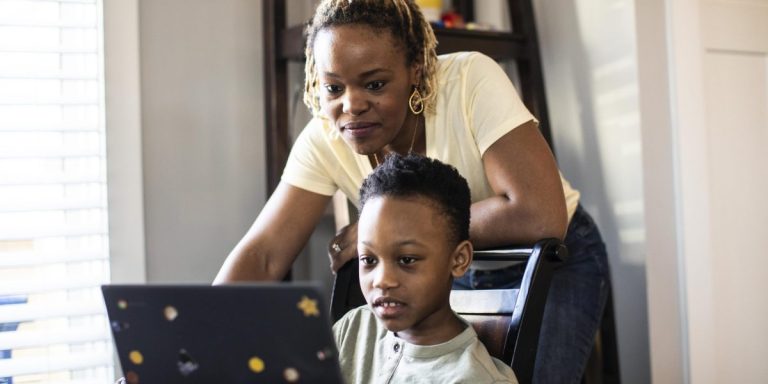There are many stories of how pandemic closures have not only deprived children of important socialization and education, but also exacerbated their already debilitating mental health conditions.
But a new study published in the journal JAMA Network Open uncovered a surprising finding: Early COVID-19 isolation may have helped some kids improve their mental health problems, even if only slightly.
“We expected to see a significant deterioration in mental health over time,” lead author Kaja Lewin, a professor at the University of California, San Francisco's School of Medicine, told Fortune. “We did, in fact, see some improvement, particularly in children with significant behavioral problems.”
Children with serious mental illnesses improved
The study was based on self-reported responses from more than 1,200 children ages 6 to 17 who filled out a checklist before and during the pandemic through the National Institutes of Health's Children's Health Impacts (ECHO) program. Lewin and co-lead author Courtney Blackwell, a professor at Northwestern University Feinberg School of Medicine, used data from before and during the pandemic to advance their research to understand how the pandemic has affected children.
Participants who entered the pandemic with significant or “clinically significant” mental health issues — such as anxiety, depression or ADHD behaviors like difficulty focusing in class — saw the biggest improvements, about 3 to 5 percent of their pre-pandemic numbers, what the researchers called “moderate declines.” And lower-income and black kids saw smaller declines in ADHD (about 0.5 percent) compared with higher-income and white kids, but even those small declines can make an impact, Lewin said.
She added that while the study's findings support other research on the topic, such as girls performing worse than boys and distance learning being beneficial for some children, it broadens the way we understand children's mental health by studying specific demographics and finding that not all children suffer from mental health in the same way, or at all.
“It adds nuance to the picture,” Lewin says.
The biggest improvements were seen in kids who were high in outgoing mental health behaviors, were prone to emotional outbursts and had attention problems, Lewin said.
Lewin and Blackwell don't know the exact reasons why some kids saw improvement, but they have some ideas.
For kids who have behavioral issues at school, Lewin said, class time can be very stressful. “Classroom can be a very difficult environment,” she said. “You have to stay focused all the time, and it's tough.”
Lewin and Blackwell believe the closures have provided relief from these conditions, which may have led to the improvements they have seen.
“If they're really anxious, being able to stay home may help relieve some of the stress and pressure they feel from being at school,” Blackwell added.
For other children, COVID-19 has brought added challenges.
Lewin said the children were fairly diverse — 52 percent were white, 32 percent were black, 12 percent were mixed race, 3 percent were other races and about 10 percent were Hispanic — and from a range of economic backgrounds.
Even with these diverse experiences, not all children’s mental health will improve during difficult times like the pandemic.
“What we were trying to show, at least in this exploratory way, is that the pandemic wasn't the same for everyone,” Blackwell told Fortune.
Blackwell and Lewin found that children who experienced an increase in mental health problems during the pandemic were more likely to experience internalizing problems, such as anxiety and depression.
Lewin wanted to emphasize that while their findings reflect differences in children's mental health experiences, they also pave the way for future research to delve deeper into what those differences are and why they occur.
Blackwell and Lewin realized the unusual circumstances created by the pandemic, with children out of school, inspired them to study how COVID-19 has affected children's mental health — a topic that still requires further research.
“We just want to provide some insight into what's going on and inspire future research,” Lewin says. “Maybe it's not the same for all kids, and some kids behave quite differently than others.”
But don't get me wrong, the pandemic has been very tough overall.
Lewin and Blackwell emphasized that their study doesn't mean the pandemic has been a particularly good time for anyone: They looked only at mental health, but there were many other factors that affected children's health during the COVID-19 outbreak.
“It was bad for kids,” Lewin said. “These small effects on mental health are negligible compared to the negative effects on educational outcomes.”
Although he was surprised by the findings, Lewin added, “I think it's really important to be clear that many of these effects were small.”
The researchers hope their study will lead to other studies that look more closely at the subgroups they studied, such as race, gender and socioeconomic background, to paint a better, more nationally representative picture of how the pandemic has affected children before, during and after infection.
“Maybe we saw these … immediate effects, and they weren't that big,” Blackwell says. “But if we can learn something from the fact that they missed school, or what were the circumstances that fostered their improved mental health,” Blackwell says. “Then we can address these inequities going forward.”
For more information on mental health, see:
Subscribe to Well Adjusted, a newsletter filled with simple strategies to work smarter and live better, brought to you by the Fortune Well team. Sign up for free today.

